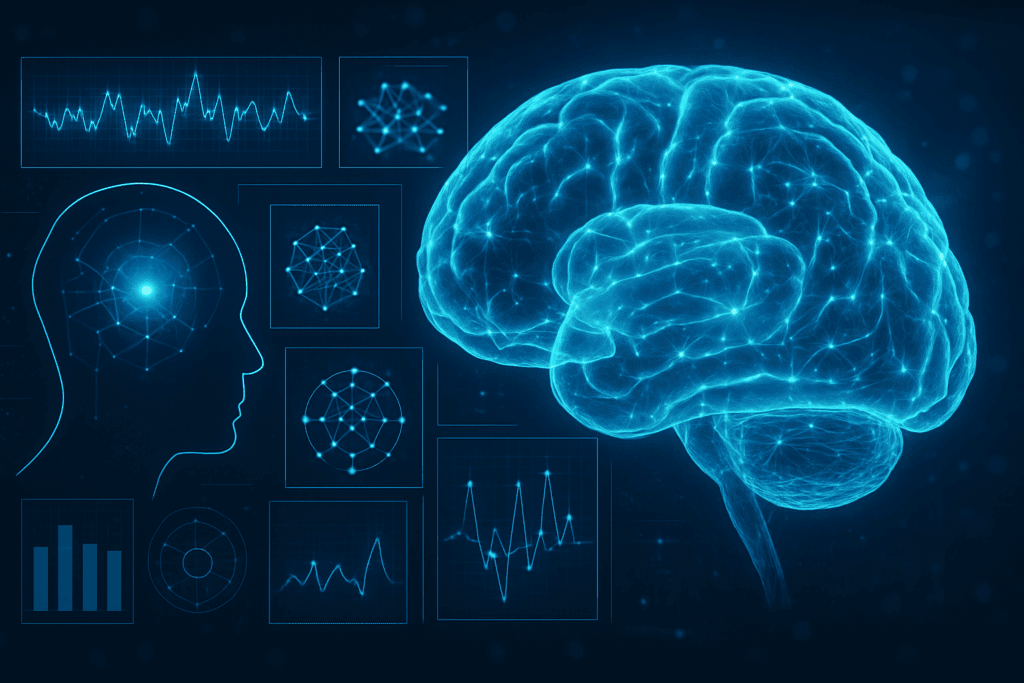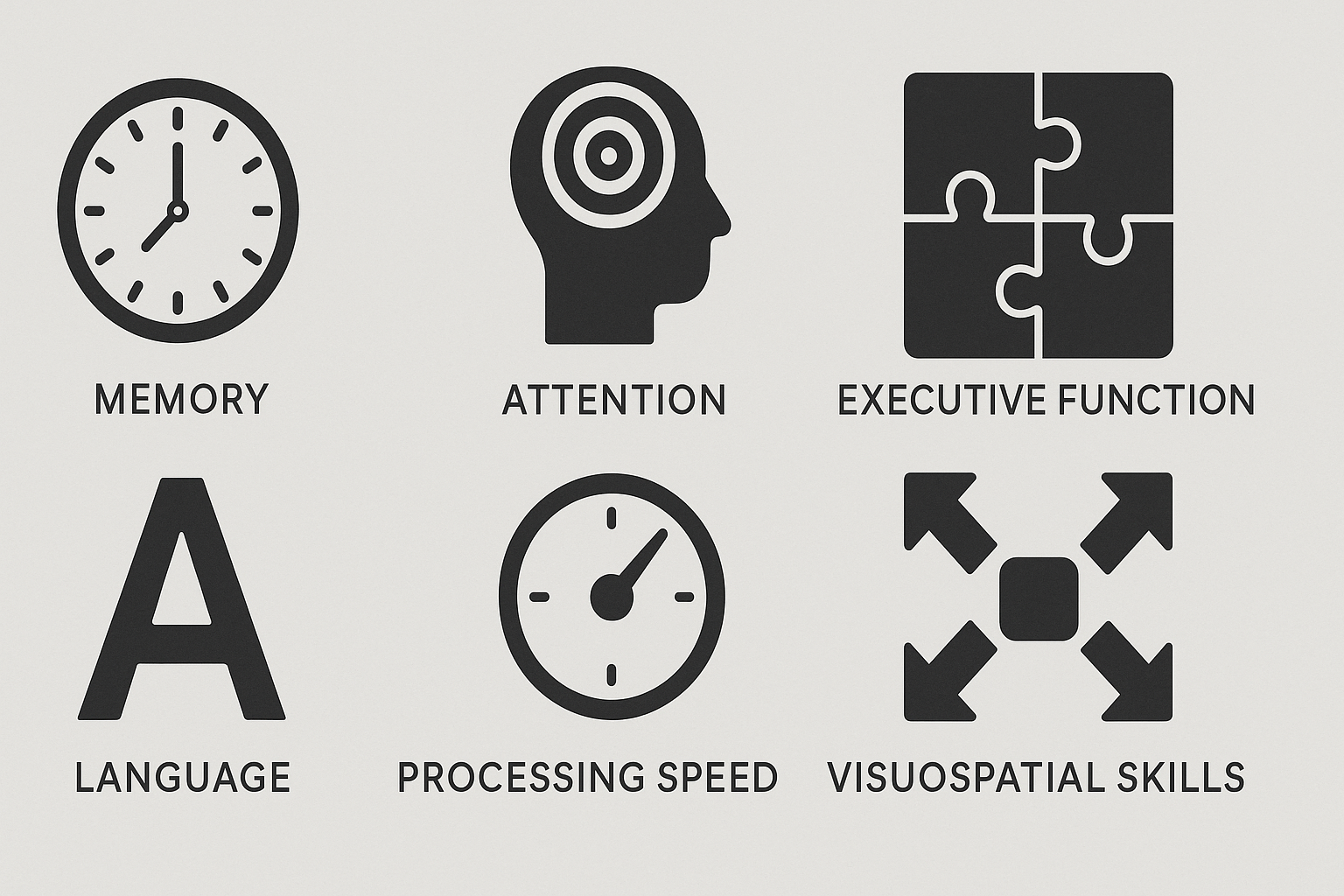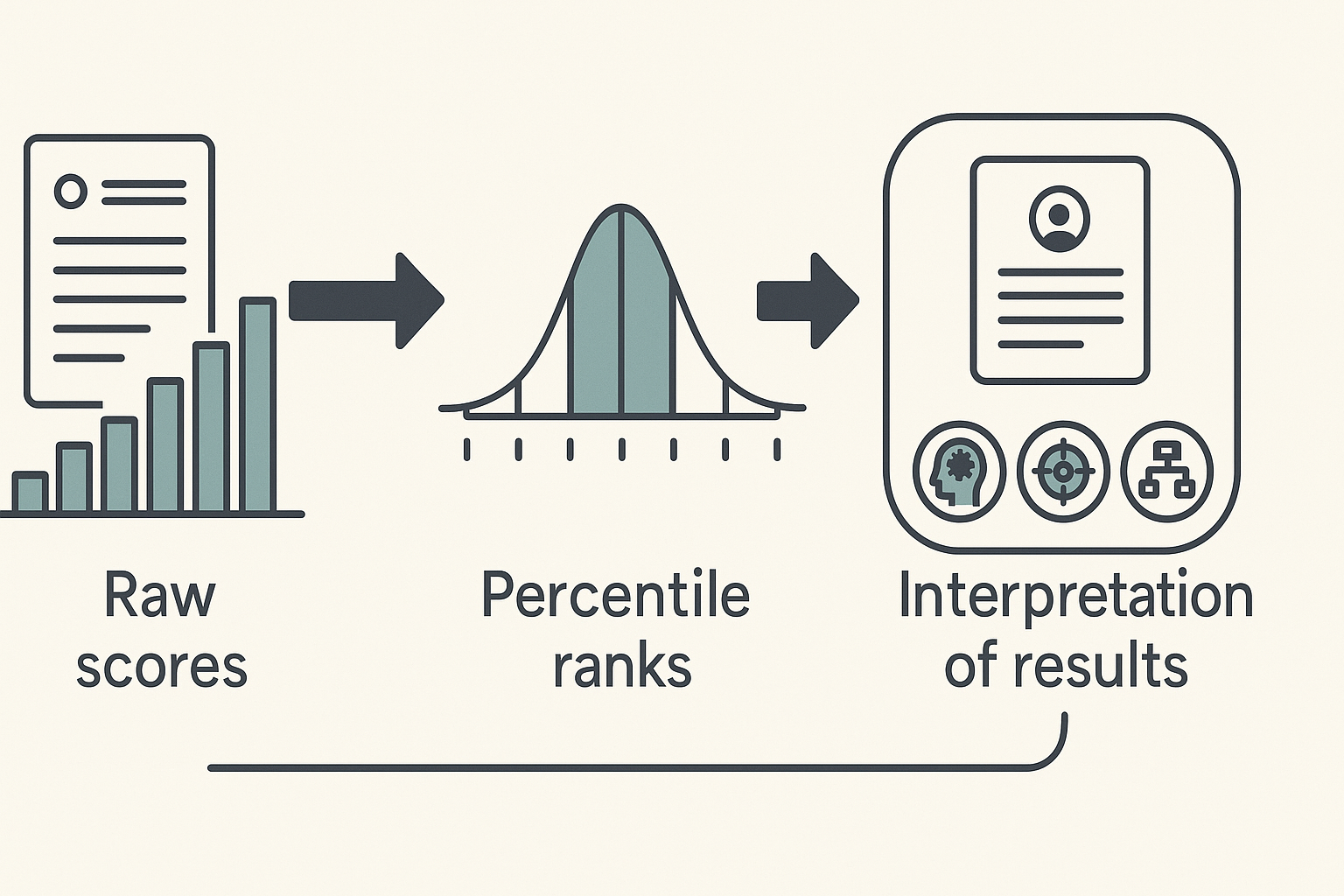Introduction: Why Cognitive Assessment Matters for Adults
As the science of brain health continues to evolve, the importance of early detection and evaluation of cognitive function in adults is becoming more widely recognized. Whether it’s a concern about memory loss, difficulty concentrating, or age-related cognitive decline, cognitive testing for adults can offer critical insights into how the brain is functioning and what support might be needed. These tests are not just tools for diagnosing dementia or Alzheimer’s disease—they also help identify subtle shifts in attention, reasoning, processing speed, and memory that can influence daily functioning and overall well-being. A comprehensive cognitive assessment for adults serves as both a snapshot of current cognitive status and a valuable baseline for tracking changes over time. It also empowers individuals to take a proactive approach to their mental wellness, guided by accurate data and expert interpretation.
In this in-depth guide, we explore the major types of cognitive tests, how cognitive assessment tests are conducted, and what the results may reveal about brain health. We also dive into the practical applications of these tools in clinical and everyday settings, demystifying the process and helping readers understand what to expect. For those seeking answers, reassurance, or simply a better understanding of cognitive performance, this article offers clarity, context, and evidence-based information grounded in clinical expertise.
You may also like: Boost Brain Power Naturally: Evidence-Based Cognitive Training Activities and Memory Exercises That Support Long-Term Mental Health

Defining Cognitive Assessments and Their Role in Adult Brain Health
Cognitive assessments are structured evaluations designed to measure a variety of mental functions that reflect how well the brain is operating. These include areas such as attention, executive function, memory, language, visuospatial skills, and processing speed. While many people associate cognitive testing with aging or neurodegenerative conditions, cognitive assessment for adults is also used in a wide range of scenarios, from head injury evaluations to pre-employment screenings and educational planning. The purpose of these tests is to gather objective data about mental performance, which can then be interpreted by qualified professionals to guide treatment, provide reassurance, or identify areas for further investigation.
One of the most powerful aspects of cognitive assessments is their ability to uncover issues that might not be obvious during a routine medical visit. Someone might feel mentally foggy, forget appointments, or struggle to follow conversations, but without a structured brain function test, these symptoms could go undetected or misattributed to stress or fatigue. By employing standardized cognitive function tests, clinicians can distinguish between normal aging and signs of cognitive impairment. These tests help rule out or confirm conditions such as mild cognitive impairment (MCI), attention-deficit disorders, depression-related cognitive deficits, and early stages of dementia.

The Science Behind Cognitive Function Tests
Cognitive function tests are grounded in decades of psychological and neurological research, ensuring that they provide valid, reliable, and replicable results. Each test is carefully designed to isolate specific mental functions while minimizing external variables that could distort outcomes. For example, memory tests may involve repeating word lists or recalling sequences of events, while executive function assessments might include problem-solving tasks that evaluate planning and inhibition control. These tools are calibrated for age, education level, and cultural background, which allows professionals to compare an individual’s performance to normative data from similar populations.
Cognitive testing for adults often includes a combination of brief screenings and more extensive batteries, depending on the complexity of the concern. A simple brain function test might take just 10–15 minutes and can identify broad areas of concern. In contrast, a comprehensive cognitive eval may last several hours and provide deep insights into cognitive strengths and weaknesses. This layered approach allows practitioners to customize testing based on individual needs and ensures that results are interpreted within the right context. The combination of quantitative scoring and clinical judgment helps distinguish between momentary lapses and patterns that suggest deeper neurological concerns.

Key Types of Cognitive Tests and What They Measure
Understanding the different types of cognitive tests is essential for appreciating the scope of what a cognitive evaluation can reveal. Memory tests are among the most well-known, measuring both short-term and long-term recall through structured tasks that assess how information is encoded, stored, and retrieved. Attention and concentration assessments evaluate an individual’s ability to sustain mental focus over time and resist distractions, which is particularly important in conditions like ADHD or after a brain injury. Executive function tests explore higher-order thinking skills such as reasoning, flexibility, and decision-making.
Language assessments are another critical component of cognitive testing for adults, often used to evaluate expressive and receptive language abilities. These might involve naming objects, understanding spoken or written language, and forming coherent speech. Processing speed tests measure how quickly an individual can take in and respond to information, which can be a key indicator of cognitive efficiency. Visuospatial tests, which assess spatial reasoning and visual perception, are frequently used in cases where neurological damage is suspected. By including a diverse array of cognitive function tests, professionals can construct a holistic picture of brain performance and detect even subtle anomalies that might otherwise be missed.

What to Expect During a Cognitive Evaluation
Undergoing a cognitive eval can feel intimidating for some, especially when it’s unclear what the process involves. In reality, most cognitive assessments are non-invasive, low-pressure experiences designed to make individuals feel as comfortable as possible. Testing typically begins with an interview to gather medical history, educational background, and any current concerns related to memory, thinking, or behavior. This initial conversation sets the stage for personalized testing and allows the evaluator to choose appropriate tools based on the individual’s profile.
Once testing begins, the individual may be asked to complete a series of paper-and-pencil tasks, computer-based exercises, or verbal responses to prompts given by a clinician. While some tasks may seem simple—like repeating a sequence of numbers or identifying pictures—their design is rooted in advanced psychological theory and neurological insight. It’s important to remember that there is no “passing” or “failing” a cognitive assessment. The goal is not to judge intelligence but to understand how various cognitive systems are functioning in concert. After testing, results are interpreted within the context of the person’s age, background, and any relevant medical conditions. A follow-up session often includes a detailed explanation of findings, along with recommendations for next steps.
Who Should Consider Cognitive Testing and When
Cognitive testing for adults isn’t just for those experiencing memory loss or confusion. In fact, early assessment can be a powerful preventive tool for anyone who wants to take a proactive role in maintaining their mental health. Adults who notice changes in focus, organization, problem-solving, or word retrieval may benefit from a structured cognitive evaluation. Similarly, individuals recovering from concussion, stroke, or chronic illness may use cognitive assessments to monitor recovery or identify areas of lingering difficulty. Even high-functioning professionals sometimes seek cognitive testing when they feel their mental sharpness has dulled or if they’re struggling to keep up with complex demands.
Older adults, especially those with a family history of Alzheimer’s or other dementias, often benefit from routine cognitive assessment tests as part of their annual wellness plan. These evaluations provide a baseline that can be tracked over time to detect meaningful changes. Mental health professionals may also recommend cognitive testing when emotional conditions like depression or anxiety are suspected of impairing cognitive performance. By identifying the nature and cause of cognitive symptoms, professionals can tailor interventions that target the root problem rather than merely addressing surface-level complaints.

How Cognitive Assessment Tests Are Scored and Interpreted
Once a battery of cognitive assessment tests has been completed, the results are carefully scored using standardized methods. Each test has its own criteria for scoring, which often involve raw scores, percentile ranks, and standard deviations from the norm. These metrics allow professionals to determine whether a person’s performance is within expected limits or if it deviates significantly from the average for their demographic group. Importantly, a single low score is rarely cause for alarm—instead, patterns of performance across different areas are evaluated to detect consistency, outliers, and potential red flags.
Interpreting cognitive testing for adults requires a deep understanding of both neuroscience and psychological assessment. Trained clinicians synthesize the data to determine whether observed difficulties are likely due to neurological conditions, emotional distress, educational gaps, or other contributing factors. For example, someone might show reduced processing speed but intact memory and executive function, suggesting that stress or fatigue could be playing a larger role than actual brain decline. This nuanced interpretation is key to ensuring that results lead to appropriate interventions, whether that means medical follow-up, lifestyle changes, cognitive therapy, or reassurance that everything is functioning normally.
Which of the Following Assessment Tools Evaluates Cognitive Impairment? Exploring the Most Widely Used Tests
When it comes to evaluating cognitive impairment, several well-established tools are commonly used across clinical settings. The Mini-Mental State Examination (MMSE) is a quick screening tool that assesses orientation, recall, attention, and language. Although brief, it provides valuable insights into overall cognitive function and is frequently used in primary care to flag potential concerns. The Montreal Cognitive Assessment (MoCA) is another popular tool, considered more sensitive to mild cognitive impairment. It includes tasks that tap into executive function, visuospatial ability, and delayed recall, offering a broader view than the MMSE.
More comprehensive tools include the Wechsler Adult Intelligence Scale (WAIS), which offers in-depth analysis of verbal comprehension, perceptual reasoning, working memory, and processing speed. The Repeatable Battery for the Assessment of Neuropsychological Status (RBANS) is another multi-domain assessment used to evaluate attention, language, memory, and visuospatial/constructional abilities. For those wondering which of the following assessment tools evaluates cognitive impairment most effectively, the answer often depends on the context, the symptoms being investigated, and the level of detail required. Clinicians may use multiple tools in tandem to ensure a complete and accurate diagnosis.
Practical Applications of Cognitive Testing in Everyday Life
Cognitive assessments are more than just diagnostic instruments—they also have practical applications that can improve quality of life and inform important decisions. For instance, cognitive testing for adults can help determine fitness for duty in safety-sensitive jobs such as aviation, law enforcement, or healthcare. In educational and workplace settings, assessments can identify learning disabilities, processing disorders, or attention deficits that may be hindering performance. By pinpointing specific cognitive challenges, professionals can recommend accommodations or interventions that support success.
In personal relationships, understanding the results of a brain function test can foster empathy and improve communication. Partners and family members may interpret forgetfulness or poor decision-making as laziness or disinterest, when in fact these behaviors stem from cognitive difficulties. With data from a cognitive eval, it becomes easier to approach these issues with compassion and develop realistic strategies for support. Additionally, assessments play a vital role in planning for aging, such as determining the appropriate level of independence, evaluating driving safety, or preparing for legal and financial decision-making. The ability to make informed, data-driven choices is one of the greatest benefits of cognitive evaluation.
Frequently Asked Questions: Cognitive Assessment for Adults
1. What are some lesser-known types of cognitive tests used in specialized fields?
Beyond the widely recognized tests like the MMSE or MoCA, many specialized types of cognitive tests are used in fields such as occupational therapy, neuropsychology, and forensic psychology. For example, the Wisconsin Card Sorting Test (WCST) is often used to measure abstract thinking and cognitive flexibility, especially in individuals with frontal lobe injuries. In aviation and military contexts, rapid decision-making and stress resilience tests are tailored to assess how cognitive function holds up under extreme conditions. These specialized cognitive function tests are crucial in high-stakes environments where executive functioning can directly impact safety and performance. Although not as commonly discussed, these tools provide a deeper level of insight into how the brain manages complex tasks and adapts to dynamic situations, making them indispensable in advanced cognitive assessment for adults.
2. Can cognitive testing for adults help detect changes related to long COVID or other post-viral syndromes?
Yes, emerging research suggests that cognitive testing for adults can be instrumental in identifying brain fog and other cognitive deficits associated with long COVID. Many patients report issues with memory, concentration, and processing speed following viral infections, and structured cognitive assessment tests offer a way to objectively track these concerns. The use of targeted brain function tests allows healthcare providers to differentiate between neurological, psychological, and physiological causes of these symptoms. Furthermore, clinicians are now incorporating cognitive eval procedures into multidisciplinary treatment plans for post-viral recovery. While more longitudinal studies are needed, early evidence supports the integration of cognitive assessments into follow-up care for those experiencing lingering cognitive symptoms post-illness.
3. How does cultural background affect the interpretation of cognitive assessments?
Cultural factors can significantly influence performance on cognitive assessment tests, especially when language, educational systems, or cultural norms differ from those used in test standardization. For this reason, cross-culturally validated types of cognitive tests have been developed to reduce bias and ensure accurate interpretation. Professionals conducting a cognitive eval for individuals from diverse backgrounds must consider culturally sensitive norms and possibly use translated or adapted versions of standardized tools. Misinterpretation can lead to either over-pathologizing or underestimating a person’s cognitive ability. Therefore, tailoring cognitive testing for adults to reflect linguistic and cultural contexts is not only ethical but essential for producing reliable, meaningful outcomes.
4. Are there digital innovations in brain function test technologies today?
Absolutely, digital platforms are revolutionizing how brain function tests are delivered and interpreted. Remote and app-based cognitive testing for adults is becoming increasingly common, enabling easier access for rural or mobility-restricted populations. These platforms incorporate artificial intelligence to adapt question difficulty in real time, enhancing the accuracy of the cognitive eval. Some systems even integrate biometrics and neurofeedback, providing a multi-modal view of cognitive performance. While traditional cognitive assessments remain the gold standard in clinical contexts, digital tools are being validated as reliable complements, especially for ongoing monitoring and early detection of cognitive decline in everyday settings.
5. How do cognitive function tests differ when used for legal or forensic purposes?
When used in legal settings, cognitive function tests serve different purposes than in general health assessments. Forensic cognitive testing for adults often focuses on issues like competency, malingering, and capacity to stand trial, requiring high specificity and legal defensibility. Tools such as the Test of Memory Malingering (TOMM) or the Rey 15-Item Memory Test help identify intentional underperformance. These types of cognitive tests are subject to more stringent documentation and often require testimony from qualified forensic psychologists. The interpretation of cognitive assessments in these settings also takes into account the motivations and psychological states of the examinee, making the context of the cognitive eval especially critical.
6. What are the risks of misinterpreting cognitive assessment for adults?
Misinterpretation of cognitive assessment for adults can have serious consequences, especially when results are used to make decisions about medical treatment, employment, or legal competency. A poorly administered or interpreted cognitive eval could incorrectly suggest cognitive impairment, leading to unnecessary interventions or stigmatization. Conversely, overlooking subtle deficits might delay diagnosis and treatment of neurodegenerative diseases. It’s essential that cognitive function tests are interpreted within the context of comprehensive clinical data, including mental health status, medication use, and life stressors. This underscores the importance of having experienced, credentialed professionals conduct and evaluate cognitive assessment tests.
7. Which of the following assessment tools evaluates cognitive impairment in the early stages most effectively?
Among commonly used tools, the Montreal Cognitive Assessment (MoCA) is often cited in clinical literature as especially effective for identifying mild cognitive impairment. When comparing which of the following assessment tools evaluates cognitive impairment most sensitively, the MoCA typically outperforms the Mini-Mental State Examination in detecting subtle executive dysfunction and visuospatial deficits. However, more extensive batteries like the RBANS or Neuropsychological Assessment Battery (NAB) offer a broader view and can catch nuanced patterns that quick screens may miss. The decision to use specific types of cognitive tests depends on the clinical context, patient history, and the level of detail required. Incorporating multiple cognitive assessments often yields the most reliable picture of early-stage cognitive decline.
8. How can cognitive assessment tests guide workplace accommodations?
Cognitive assessment tests can play a pivotal role in supporting workplace success by identifying areas where accommodations may be beneficial. When subtle cognitive challenges affect performance, such as slower processing speed or difficulty multitasking, a brain function test can help pinpoint the issue. With these insights, employers can make informed modifications, like adjusted deadlines, assistive technology, or revised responsibilities. For professionals in cognitively demanding roles, cognitive testing for adults can help maintain productivity and well-being without compromising job standards. Moreover, these types of cognitive tests can be instrumental in disability claims, vocational rehabilitation, or return-to-work planning after illness or injury.
9. Is it possible to improve performance on a cognitive eval with training?
While it’s not possible to “study” for a cognitive eval in the traditional sense, engaging in regular cognitive training can enhance certain domains measured by cognitive assessments. Brain-training programs, memory techniques, and attention exercises can improve neuroplasticity and may result in better outcomes on future cognitive function tests. However, these improvements are typically domain-specific and may not reflect a global increase in cognitive capacity. Some types of cognitive tests are designed to detect learning effects, meaning that repeated exposure won’t necessarily yield higher scores unless true improvement has occurred. Practitioners often recommend cognitive testing for adults both before and after an intervention to evaluate effectiveness over time.
10. How can families support a loved one in preparing for a cognitive assessment for adults?
Family support plays a vital role in preparing someone for a cognitive assessment for adults. Encouraging open conversation about why the test is being done can help reduce anxiety and foster cooperation. It’s helpful to ensure that the individual is well-rested, hydrated, and free from distractions on the day of the cognitive eval. Families can also provide background information to clinicians that may not be obvious during testing, such as changes in behavior, mood, or functioning. After the cognitive function tests are completed, relatives can assist in interpreting recommendations and implementing any suggested lifestyle changes or therapies. Their involvement adds an invaluable layer of emotional and logistical support, enhancing the benefits of the overall cognitive assessment process.
Conclusion: Embracing Cognitive Assessments as a Gateway to Lifelong Brain Health
Understanding what to expect from a cognitive assessment for adults is more than a matter of curiosity—it’s a vital step toward proactive brain health. As we age or encounter stressors, life events, or health challenges that affect mental clarity, the ability to access accurate and nuanced information about our cognitive status becomes invaluable. Cognitive function tests, when administered and interpreted by trained professionals, offer more than just numbers on a page. They provide a roadmap for better living, helping individuals harness their strengths and address their challenges with clarity and purpose.
From the variety of types of cognitive tests to the detailed insights offered by comprehensive cognitive assessment tests, this process empowers individuals to take control of their mental wellness. Whether one is navigating recovery from illness, managing chronic stress, or simply aiming to preserve sharpness into later life, a cognitive eval can illuminate the path forward. With growing public awareness and medical endorsement, cognitive assessments are increasingly recognized as essential components of whole-person care. By embracing these tools, individuals and professionals alike can foster resilience, independence, and sustained cognitive vitality across the lifespan.
Further Reading:
Cognitive tests are short, quick tests to check how well your brain is functioning.


